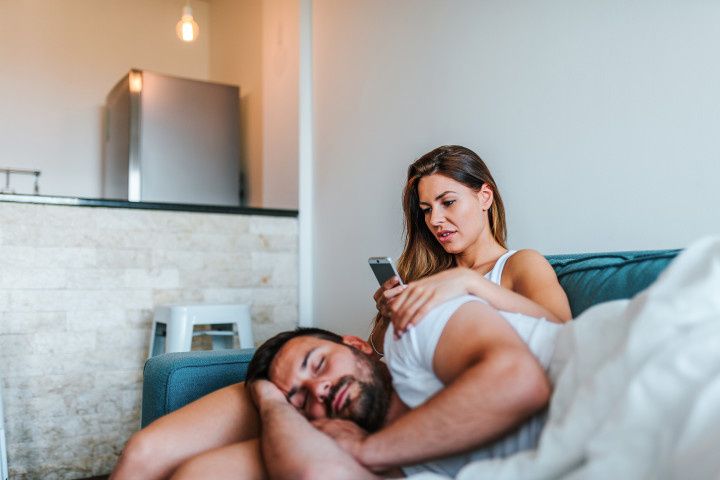8 Questions to Ask Yourself Before Signing Up for Couples Counseling
Not sure whether couples counseling is right for you? Ask yourself these important questions to help make the decision.


Couples therapy can be truly life-changing for two people in a relationship, whether they’re dating, recently married or have just celebrated their 25th anniversary. But, for most couples, having the “couples counseling” conversation can be rather threatening. Many people assume that couple’s counseling is only for couples who are at the end of their rope; however, this couldn’t be farther from the truth.
In fact, couples counseling can be helpful for almost all couples, according to Erica James, LMFT, based in New York. “Therapy in general is meant to deepen your understanding of yourself, learn your triggers, and different ways to cope,” she says. “Oftentimes, our romantic relationships bring up our ‘stuff’ from childhood or other primary and important relationships, so couples therapy can help with knowing how to manage those moments of difficulty, having a deeper understanding of yourself and your partner, and being able to communicate and cope in a healthy and intimate way.”
Those who are against couples therapy usually don’t truly understand what it’s all about. In general, couples counseling, also known as marriage therapy, is simply a safe space for two individuals to examine and make the needed changes to their relationship, explains Michelle Pomeroy, LAMFT, with the EFT Clinic for Couples and Families in Salt Lake City. “The goal of couples therapy can vary depending on the couple, but common ones include improving marital satisfaction, bettering communication, strengthening emotional connection, boosting sexual intimacy, and fulfilling deep relationship needs such as feeling seen and accepted by their partner.”
While marriage counseling might sound like something that only married couples participate in, Pomeroy notes that it can also be quite beneficial for couples who plan to marry, as it gives them an opportunity to gain a deeper understanding of each other and work out differences prior to saying “I do.” No matter the stage of your relationship, however, she points out that the most successful couples in counseling are those who are committed to their partner and to the process of therapy.
If you’re not sure whether or not couples counseling is right for you and your partner, consider asking yourselves these key questions.
Am I committed to this person long-term?
Before you go to couples counseling, it’s a good idea to decide whether or not you’re truly all in for the relationship itself. “If there isn’t commitment, the other partner will feel that their partner is one foot in, one foot out and it will minimize the trust that should be building,” says James. Therefore, she recommends asking yourself whether you truly see yourself with this person and can clear up different expectations before going into counseling. “If you find that you don’t see yourself with this person, therapy could help with being able to have that difficult conversation with your partner,” she adds.
Have you had previous failed relationships?
Chances are, the answer to this question is “yes” unless your significant other is your one and only serious partner. And that might mean that couples counseling is something you could benefit from. “It's been said that what we don't heal in one relationship we will carry to another,” says Pomeroy. “Therapy can help you explore what went wrong previously and help you do things differently and to find a mutually satisfying connection with someone.”
Do you get stuck in the same arguments in your relationship?
If you and your partner agree that you both feel like you keep having the same argument over and over again it can be quite frustrating, but it also might mean that it’s time for couples counseling, which Pomery notes can help couples understand and break that negative cycle. “A couples therapist can help you figure out what you are really fighting about, stop it, and learn to do it differently.”
Do you feel apprehensive about committing or getting married?
If you’re feeling nervous or anxious about getting married, whether you’re engaged or think you might be in the near future, know that it’s very normal. You’re about to make a huge, life-changing decision. “Underneath those nerves are past experiences that inform how we feel about relationships,” explains Pomeroy.” In counseling you have the opportunity to better understand where this might be coming from for you and/or your partner.”
Do you want the best for your relationship?
Of course, the answer to this question is likely yes. If so, consider couples counseling even if you're not sure that you truly “need it.” “People often use therapy like an emergency room—they go when there is a big injury or crisis in the relationship,” says Pomeroy. “Consider what it would be like to see couple counseling more like physical therapy where you as a couple strengthen your relationship and learn what's needed to get you back into alignment.”
What kind of therapist would be a good fit for us?
Once you’ve decided to partake in couples counseling, it’s a good idea to consider which therapist might be best for you as a couple. “Some therapists are more direct and will give you specific tools, others will let you lead the session and gently guide you to figuring things out for yourselves,” says Emma Carpenter, MA, Level 3 Gottman-Trained Therapist with A Better Life Therapy in Philadelphia. “If you’re not sure, it's normal to try a few different therapists before finding one that's a good fit.”
How often can you afford to go?
At the onset of therapy, your therapist will likely recommend a frequency of sessions based on your needs. This is typically weekly for a month or two to get the basic structure and tools, and then spread out from there, according to Carpenter. “It's important to know how often you and your partner can afford to go—not financially, but in terms of your schedule—because that will impact how quickly you see changes taking place and therefore helps set a more realistic expectation of therapy,” she says. “If you only come once a month, or inconsistently, you're not going to see consistent or fast results.” She recommends figuring out a budget together and planning for how to make sure you are scheduling consistent sessions.
What am I hoping to get out of this experience?
“Expectations being clear from the beginning are really important,” says James. “It happens where one person might have their foot out and is going to appease the other, but the other partner is unaware, so it’s important to know what success would look like after this experience and what specific aspects of your relationship you’re hoping to improve.”





